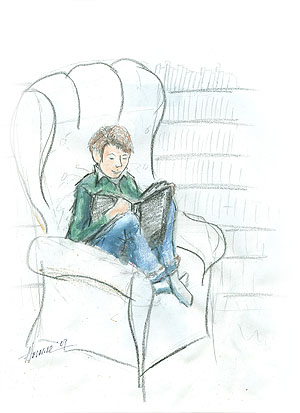A little boy threw down the wash towel and refused to wash the dishes.
His young father, who probably didn’t like washing dishes, either, said, “OK. If you won’t do the dishes, then you must do something else.”
“But, why?” asked the boy. “Why must I do something I don’t like!”
“I didn’t say you wouldn’t like it. I just said if you aren’t doing one thing, it just means you will be doing something else, instead.”
“I don’t understand,” said the boy.
“Have you ever done two things at the same time?” the father asked.
The boy shook his head.
“How about if we find something you like to do,” the father said, taking the boy and walking toward his study, “and let’s see if you can do more this afternoon than if you would be standing here washing dishes? Would you like to see how?”
Eyes bright, the boy nodded. He loved his Dad. His Dad was smart and fun. And he wanted to get as far away from those dirty dishes as he could.
His father’s study wasn’t the biggest room in the cement-block house which had been built by his grandfather. In fact, it doubled as his mother’s sewing room where she mended their clothes and made curtains for the windows. An ironing board, propped against the wall; her steam-iron with its electrical chord wrapped neatly around and a bottle of distilled water nearby were the tools of an imaginative and skilled seamstress. In the center of the room, there was a comfortable chair, covered in golden fabric. A jaded decorator of interiors would say the chair was too big for the space in which it was kept. Perhaps the chair had out-grown it’s surroundings, like the man to which it belonged. Perhaps it was the young father, himself, who had out-grown things … or never really fit them at all. The young father motioned to his chair. “Sit here,” he said to his nine year-old son.
On a wall beside the chair, from floor to ceiling, there were wooden shelves. On the shelves, there were books – books of many different colors and titles. Carefully, The young father selected a book, opened it to the first page, and handed it to his son.
“I don’t know if this was written by a man who didn’t like to wash dishes,” he said. “But, I’d like to know what you think about his ideas.” He smiled. “Can you read a chapter and write a letter to me, telling me what you think?”
As his father left the room, the boy considered his fate. Slowly, he began reading. As he read the words, he began hearing them – and seeing them – as if he were in a giant movie; not watching it, but actually being within it. He could sense music. He could touch and feel what the writer described … and then, it was his turn to explain to his father, in a letter, what he had discovered in those pages.
“Dear Dad … There was a man who came upon two men digging ditches. He asked the first man what he was doing. And, the man laughed and said ‘What does it look like! I’m digging a ditch. Get out of my way!’ Then he asked the other man what he was doing. He asked both of them the same thing, but this man was different and he smiled and said, ‘Me? I’m helping to build a house.’”
Upon reading his son’s letter, the young father asked, “Which of the two men did you like best?”
“Not the first one,” the boy said.
“Why not?”
“I don’t know.”
“Who do you think was happier at the end of the day?” asked the young father.
“The one I liked,” said the boy.
“You mean, the one who knew he was doing something more important than just digging a ditch?”
“Yes. I liked him.”
“How did it feel being in one place and thinking about something else at the same time?”
A strange expression went through the boy’s face.
“I found this in the kitchen,” the young father said, handing his son a dish-towel. “Come on. Let’s build something.

